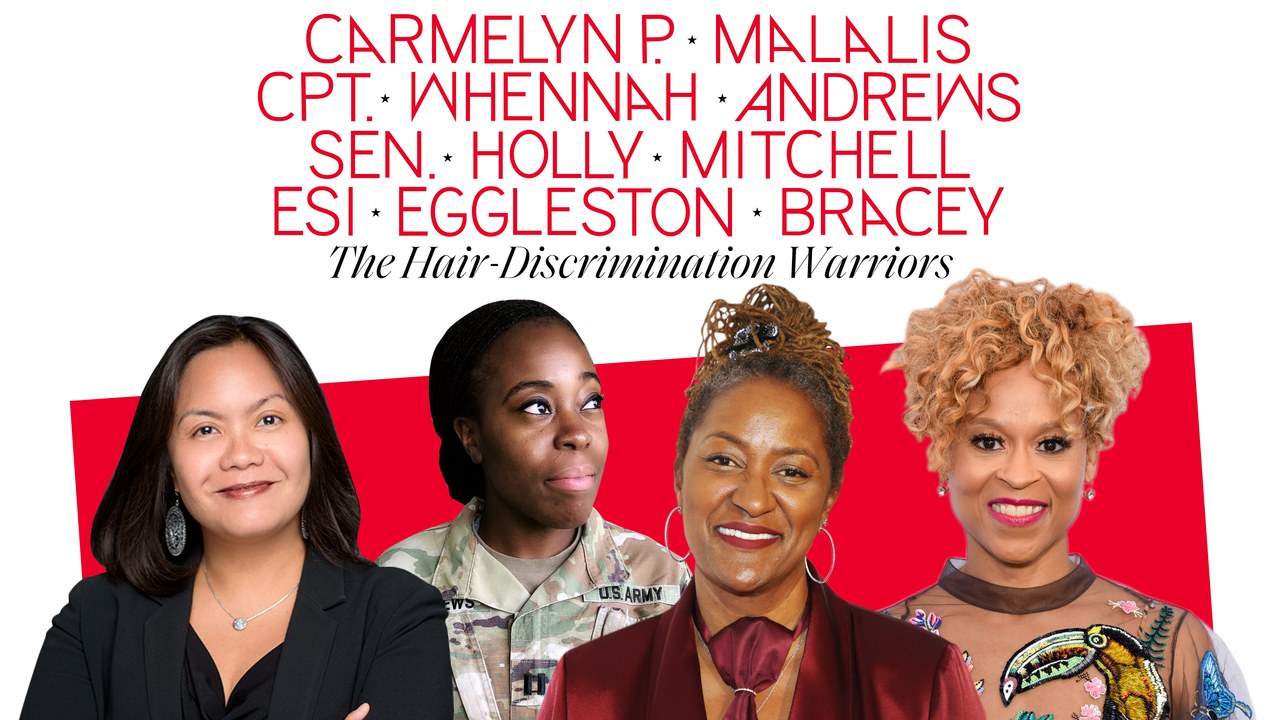Employers Have Policed Black Hair for Decades. These Women Have Had Enough.

“As a black woman who’s worn my hair natural since 1995, I’ve understood how important hair and hair texture is for women, especially the issues we’ve had surrounding our hair,” says Eggleston Bracey. That’s also why she felt a corporate responsibility to expand on [Unilever brand] Dove’s commitment to real beauty and diversity. “I was looking out around the room, and I was looking at how diverse the legislative officials were; how many of our black legislative officials had textured hair. And it occurred to me, ‘Wow, with this critical mass, we can change this.'” Her plea to those legislators? Find a resolution to hair discrimination.
Eggleston Bracey’s speech cut right to Mitchell’s core. “It’s personal for me from many perspectives,” the senator tells Glamour. Growing up, she wore braids with decorative beads through high school—a style that helped solidify her sense of self. She now wears locs. “Fast forward several years, to having my son in high school. He wore twists to school on the first day of his junior year, then came home that evening and made the decision to take them out, because he wasn’t comfortable with bullies,” she says, adding, “I graduated from high school in 1982 in Riverside [California], which wasn’t a bastion of progressive politics. At no point was my wearing braids to school every day an issue. I thought, How did we go backward?”
Mitchell flagged down Eggleston Bracey as soon as she got off the podium.
“I followed her out of the breakfast, grabbed her staff member, gave them my card, and said, ‘Here I am, a state senator in California, the fifth-largest economy in the world. A progressive, important state legislature, and I’m loc’d. I think it would make sense that I carry the bill,'” Mitchell recalls. It’s a crucial example of just how vital representation in our boardrooms and our legislation truly is—in few other scenarios could two people with the power to make change not only empathize but honestly understand why the need for protection against hair discrimination is so imperative.
From there, the two went to work, recruiting the help of a handful of activist organizations to co-found the CROWN (Creating a Respectful and Open World for Natural Hair) Coalition. While Mitchell began drafting language for the bill, Eggleston Bracey led Dove’s CROWN Research Study, in which the brand surveyed 2,000 women ages 25 to 64 who worked in office settings to uncover just how societal norms and corporate grooming policies unfairly impact Black women in the workplace. The results, depending on your own awareness, were either shocking…or not.
“What the study showed is how pronounced and prevalent the issue around hair is,” says Eggleston Bracey. “Eighty percent of women reported that they’ve changed their hair from its natural stage to fit in a corporate environment. That’s four out of five black women in the study. I knew it would be an issue, but to see how broad-scale and pervasive it was [was surprising].” Another stat that was widely reported from the survey? Black women were 50 percent more likely to have reported having been sent home or know of a black woman sent home from the workplace because of her hair.
The stats and Mitchell’s powerful introduction of the bill spoke for themselves. In July, the California state assembly unanimously passed The CROWN Act. Five days later, the governor signed it into law, making California the first state to legally enforce that locs, twists, and braids are just as school- or business-appropriate as any other hairstyle. New York state followed 12 days later with its own anti-discrimination bill.
Some have made the argument that there are more pressing issues to set legislation around than hair, a complaint both Malalis and Mitchell have heard repeatedly. “When we first came out with our guidance, there were some folks who said, ‘Hair? Who is going to care about hair?'” says Malalis. “But there were other folks who said, ‘I cannot believe you actually have to say this. I can’t believe people don’t know this is racist.’ The reality is that so many people have been experiencing this because schools and employers have never really cross-examined their own policies or what’s behind them. Is this really about health and safety? No, it’s not. Because even the U.S. Army who exacts the highest degrees of health and safety amongst its ranks has also said this is not okay. So if it’s not about health and safety, what [are these rules] really based on?”
